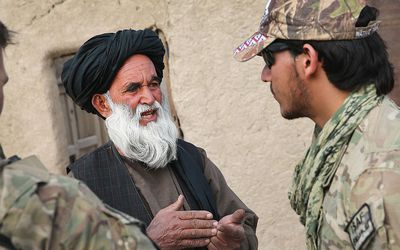
Advocates push for additional visas for the Afghan Special Immigrant Visa (SIV) Program

Photos courtesy: GettyImages. Afghan local interpreter is interpreting for the US military in Afghanistan
The Consolidated Appropriations Act for FY 2019, as enacted on February 15, 2019, authorized 4,000 additional SIVs for Afghan principal applicants, for a total of 18,500 visas allocated since December 19, 2014.
What is the Afghan Special Immigrant Visa program?
The current visa program for the Afghans who were Employed by/on Behalf of the U.S. Government is called Chief of Mission (COM). Iraqi and Afghan translators and interpreters who have worked directly (not as contractors) for U.S. Embassy Baghdad or U.S. Embassy Kabul are considered to have been under COM authority. Anyone (interpreters, chefs, contractors, guards who have worked directly for the U.S. government programs and projects in Afghanistan are eligible to apply for the Afghan Special Immigrant Visa (SIV) under Chief of Mission (COM).
In the beginning, visas were only allocated to the Afghan and Iraqi translators who worked with the U.S. Armed Forces or under Chief of Mission authority as a translator or interpreter in Iraq or Afghanistan. In 2009, the program expanded to all Afghan nationals who provided faithful and valuable service to the U.S. government, while employed by or on behalf of the U.S. government in Afghanistan and continues until the present day.
Visas and Obstacles?
Visas are limited for the Afghans and it depends on Congress to continue or end the program. But this Fiscal Year (FY), the Congress authorized 4,000 additional SIVs for Afghan principal applicants, for a total of 18,500 visas allocated since December 19, 2014. There are thousands of cases pending to COM approval, waiting for interviews and hundreds waiting to receive visas. Although it seems a big figure, is not enough for thousands of Afghans who courageously supported the United Staes Global War on Terror in Afghanistan risking theirs and families lives.
Legislative History of SIV
FY 2006: Under section 1059 of the National Defense Authorization Act for Fiscal Year 2006 (Public Law 109-163), up to 50 Iraqi and Afghan translators/interpreters who worked for the U.S. Armed Forces to receive special immigrant visas (SIVs) each fiscal year (FY). This law was later amended and now provides SIV status for eligible Iraqi and Afghan translators/interpreters who have worked either directly with the U.S. Armed Forces or under Chief of Mission (COM) authority at U.S. Embassy Baghdad or U.S. Embassy Kabul.
FY 2007 and 2008: Public Law 110-36 and Public Law 110-242 in which then-President Bush signed on June 15, 2007, amended the law above by expanding the total number of SIVs issued to Iraqi and Afghan translators/interpreters working for the U.S. military to 500 a year for FY 2007 and FY 2008 only.
FY 2009: The Afghan Allies Protection Act of 2009, Section 602(b) of Division F, Title VI, of the Omnibus Appropriations Act, 2009, (Public Law 111-8), This law allowed up to 1,500 Afghan nationals who provided faithful and valuable service to the U.S. government, while employed by or on behalf of the U.S. government in Afghanistan after October 7, 2001, for not less than one year, and who have experienced or are experiencing an ongoing serious threat as a consequence of that employment, to receive special immigrant visas (SIVs) annually through FY 2013, with the allocation of any unused visas from FY 2013 to FY 2014. The period of qualifying employment was later extended under subsequent legislation. See law above.
FY 2014: The Consolidated Appropriations Act, 2014, Section 7034(o) of Division K, Title VII of Public Law 113-76, This law, signed on January 17, 2014, extended the Afghan SIV Program. It authorized the issuance of 3,000 visas to principal applicants in fiscal year (FY) 2014 and allowed that any unissued visas from FY 2014 be allocated to FY 2015.
FY 2014: Emergency Afghan Allies Extension Act of 2014, Section 1 of Public Law 113-160, This law, signed on August 8, 2014, extended the Afghan SIV Program. It authorized the issuance of 1,000 visas to principal applicants by December 31, 2014.
FY 2015: National Defense Authorization Act for FY 2015, Section 1227 of Public Law 113-291, This law, signed on December 19, 2014, extended the Afghan SIV Program. It authorized the issuance of 4,000 visas to principal applicants by September 30, 2016.
FY 2016: National Defense Authorization Act for FY 2016, Section 1216 of Public Law 114-92, This law, signed on November 25, 2015, extends and amends the Afghan SIV Program. It authorizes the issuance of 3,000 additional visas to principal applicants with no end date by which they must be issued.
FY 2017: National Defense Authorization Act for FY 2017, Section 1214 of Public Law 114-326, This law, signed on December 23, 2016, extends and amends the Afghan SIV Program. It authorizes the issuance of 1,500 additional visas to principal applicants with no end date by which they must be issued. It also extends the date by which applicants must apply for Chief of Mission approval from December 31, 2016 to December 31, 2020.
FY 2017: Consolidated Appropriations Act for FY 2017, Section 7083 of Public Law 115-31, his law, signed on May 5, 2017, authorizes the issuance of 2,500 additional visas to Afghan principal applicants with no end date by which they must be issued.
FY 2018: National Defense Authorization Act for FY 2018, Section 1213 of Public Law 115-91, This law, signed on December 12, 2017, authorizes the issuance of 3,500 additional visas to Afghan principal applicants with no end date by which they must be issued.
FY 2019: The Consolidated Appropriations Act for FY 2019, as enacted on February 15, 2019, authorized 4,000 additional SIVs for Afghan principal applicants, for a total of 18,500 visas allocated since December 19, 2014.
The Afghan Special Immigrant Visa Program is a great way to appreciate those who have served faithfully alongside the brave American troops abroad to begin a new life in the United States and bring innovative ideas for growth and success.

